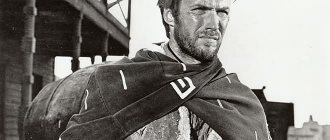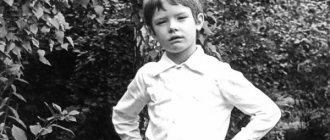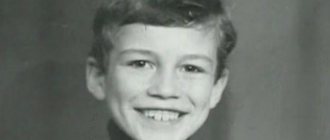Parents and birth
Andrei was born in a Moscow maternity hospital on March 7, 1941. But when registering, his parents noted his date of birth – March 8th. Later, his mother Maria Vladimirovna said: “Andrey is a gift and surprise to the entire female gender for International Women’s Day.”
His father and mother were accomplished pop artists. On stage, Alexander Semyonovich Menaker and Maria Vladimirovna Mironova created bright comedic and satirical images. Their life paths crossed during a tour in the city of Rostov-on-Don; both had families at that time. The feelings that flared up were so strong that Andrei’s parents immediately divorced their marriages and got married.
In his first marriage, Menaker was married to ballerina Irina Lascari, they lived in St. Petersburg, and a small son, Kirill, was growing up in the family. After leaving for Maria Mironova, Alexander Semyonovich made every effort to ensure that his sons from different marriages, Andrei and Kirill, became friends. In the future, the brilliant actor Andrei Mironov and the famous choreographer Kirill Lascari really became very close, the relationship between them was not like between half-brothers, but like between relatives.
We can say that Andrei Mironov’s close connection with the theater began even before his birth. His mother’s contractions began right on stage during the performance, and she was taken from the theater to Grauerman’s maternity hospital.
Childhood
Four months after Andrei's birth, the war began. The theater where Mironova and Menaker worked was evacuated to Tashkent, where the future actor spent his early childhood.
During the evacuation, Andryusha became very ill; doctors diagnosed tropical fever. The disease was so severe that Maria Vladimirovna constantly listened to her son - whether he was breathing or not. And the baby lay on the floor, motionless, he did not even have the strength to cry. The wife of the pilot M. Gromov helped get medicine for the boy, and thanks to the treatment, Andrei began to recover.
Andrei Mironov did not remember the years spent in Tashkent. But the time when, after the war, the family returned home to Moscow, and the country was recovering from devastation, was perfectly etched in my memory.
From birth, Andrei was registered with his father's last name - Menaker. But before he went to school, a new wave of persecution of Jews began in the country, and, fearing for the fate of their child, the parents decided to rewrite Andryusha with his mother’s last name - Mironov. With new documents and a last name, Andrei went to the first grade of a Moscow boys' school.
The creative atmosphere in the family did not have much influence on Andrei’s childhood hobbies. As his mother recalls, in early childhood he was not particularly interested in anything. Sometimes he liked to pretend to be a jazz musician; he would take utensils from the kitchen (forks, spoons, ladle) and play with them on pots and plates.
Andrei had an ordinary Soviet post-war childhood, he often played football in the yard with the boys, collected badges, loved ice cream and simply loved running to the next showing of a “trophy” movie. At school he was not a particularly good student, he did not like exact sciences, but in the class he always took a leading position and was the ringleader.
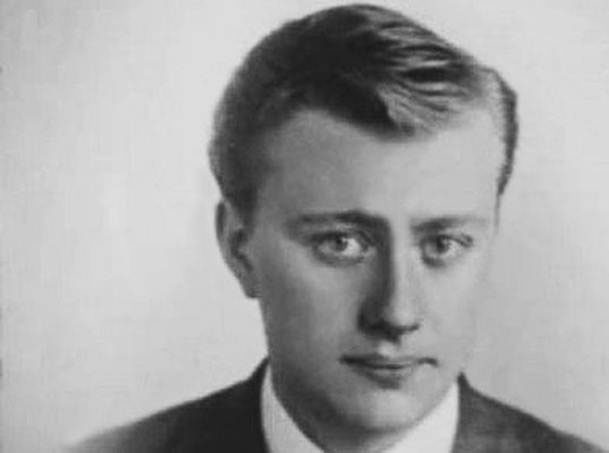
Childhood and family
Andrei Aleksandrovich Mironov (surname at birth - Menaker) grew up in a creative acting family. His father, Alexander Menaker, performed in musical feuilletons and then became involved in directing, and his mother, Maria Mironova, played at the Theater of Modern Miniatures and at the Moscow Art Theater, and also starred at that time in the musical comedy by Grigory Alexandrov “Volga-Volga” (1938) . Andrei's half-brother on his father's side was Kirill Laskari, who became an honored choreographer.
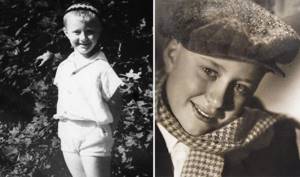
Andrei Mironov in childhood
Frequent guests of Andrei's parents were writers Mikhail Zoshchenko and Valentin Kataev, the legendary Faina Ranevskaya and Leonid Osipovich Utesov.
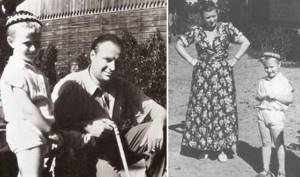
Andrey Mironov with his parents
Andrei Mironov's parents met at the State Variety and Miniature Theater, where they served as actors and soon created a duet. Three years later, in 1941, their first-born Andrei was born in Moscow, literally on the theater stage - Maria Vladimirovna’s contractions began right during the performance.
A few months after Andrei’s birth, the war began. The theater of miniatures moved to Tashkent, and there the boy became seriously ill - doctors believed it was tropical dysentery. The disease was very serious, and Andrei’s mother was very worried about his life - to her joy, they were helped to get the necessary medicine.
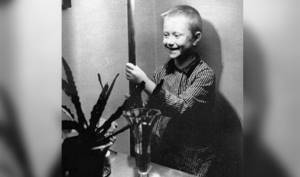
Andrei Mironov had to change his last name as a child
In 1948, Andrei Menaker went to Moscow school No. 170 (now No. 1278). Soon the anti-Semitic “Doctors’ Plot” broke out, and the parents were advised to change the boy’s surname - so Andrei forever became Mironov.
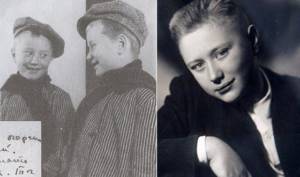
As a child, Andrei Mironov grew up as an ordinary child
Little Mironov's hobbies were quite common for children of that time. The boy kicked a ball, constantly ran to the cinema, collected badges and loved ice cream. At school, he was the leader and ringleader, he was an average student and did not like exact sciences.
School years
In the summer, the family went to the village of Pestov near Moscow, where a holiday home for artists was located. A lot of famous people gathered there: artists and actors, musicians and writers, sculptors and dancers. During the holidays, Andryusha was literally saturated with the spirit of creativity and art, and many celebrities, looking at the boy and his behavior, noted that he was growing up to be a very artistic person.
The boy began to become more and more interested in theater; at school he took part in all productions. There was also a failed film debut in the biography of Andrei Mironov. In 1952, parents brought their son to the set of the film “Sadko”. The screen tests were unsuccessful, and the boy did not get the role. The director selected children to be extras of poor children, but under his torn clothes Andrei turned out to have a fashionable T-shirt, and he was sent off the set. The incredibly clean Mironov could not put beggar's rags on his naked body and paid for it with his first role.
This hooked him in a way that was not childish, and Andrei began to teach and play roles in the school drama club with even greater zeal. The audience warmly accepted the characters he played.
He felt the taste of the theater stage, the recognition of the audience and enrolled in a circle at the central children's theater. And when it was necessary to finish school and decide on the choice of a future profession, Andrei saw no other option for himself but to apply to the Shchukin School.
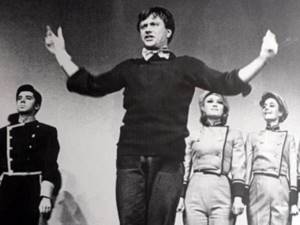
Studying at the theater
Maria Vladimirovna saw her son as a diplomat and hoped that Andrei would enter MGIMO after school. But the young man waited until his parents went on tour and submitted documents to the Shchukin Theater School. He didn't say a word about his famous relatives, and no one even knew about it.
Excitement did not prevent Andrey from successfully passing the entrance exams. He became a student. And from then on, the teachers lost peace and sleep. The inner perfectionist forced Mironov to retake the Bs, running on their heels.
But Andrei Alexandrovich quickly fell in love. The young man was the life of the party, and his mentors forgave him a lot for his enormous talent. For example, the first filming. Students were prohibited from participating in filming, and many were expelled. But when Mironov played a small role in the film “What if this is love?”, he was forgiven. And he really enjoyed filming. And now Andryusha’s goal was to conquer cinema.
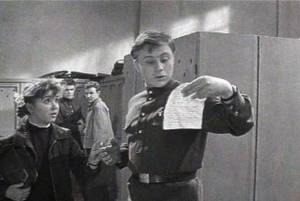
Andrei Mironov and Nina Shorina in the film “What if this is love?”, 1961
Student life and early career in theater
In 1958, he brilliantly passed the entrance exams and became a student at a theater school.
Not a single person on the admissions committee knew that Andrei was the son of famous actors. He was so worried that when he entered the examination hall, he felt blood pouring from his nose. But he nobly wiped it away and passed the exam. He was enrolled in the course of Joseph Rappoport.
He studied very diligently, dreamed of a diploma with honors, as soon as he received less than “excellent” on some exam, he immediately ran to retake it.
Among all the students, he stood out for his impeccable cleanliness; Mironov was always dressed to the nines and fragrant with pleasant aromas. He often took a taxi home, for which he had to re-borrow money more than once.
Students were forbidden to act in films, but still they tried to get on the screens by hook or by crook. Andrei tried to avoid this temptation. Once he took part in screen tests for the film “Farewell, Doves,” but was not approved.
In 1962, Andrei graduated from college with honors, and he was immediately invited to the Satire Theater, where he served for 25 years. His temperament and incredible talent immediately became obvious, and soon Andrei unwittingly became one of the favorites of director Valentin Pluchek. It was very easy to work with him; with his unbridled energy, he charged everyone who fell into the field of his charm. Even experienced theatergoers admired his performance.
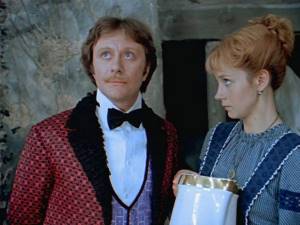
He demonstrated exceptional performance and talent immediately in his first productions:
- "Plum";
- "24 hours a day";
- "Bug";
- "Sword of Domocles";
- "Catcher in the rye";
- "Lev Gurych Sinichkin."
After the performances “The Tricks of Scapin” and “The Convent” fame, popularity and love of the audience came to him. Buying a ticket to the Satire Theater was now problematic; everyone wanted to go to the production with the rising star Andrei Mironov.
Andrey Mironov - actor and director of the Satire Theater
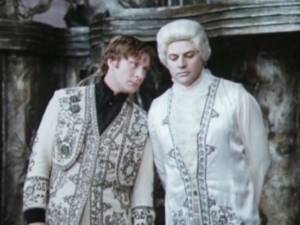
Andrei Mironov (left) as Figaro and Alexander Shirvindt as Count Almaviva in Valentin Pluchek’s teleplay “Crazy Day, or The Marriage of Figaro.” 1973 Moscow Academic Theater of Satire, Moscow
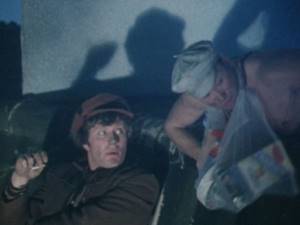
Andrei Mironov (left) as Rulle in Margarita Mikaelyan’s teleplay “The Kid and Carlson, who lives on the roof.” 1971 Moscow Academic Theater of Satire, Moscow
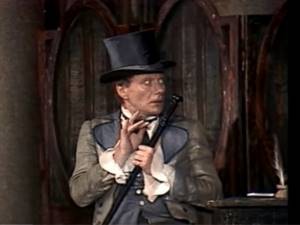
Andrei Mironov as Khlestakov in Valentin Pluchek’s teleplay “The Inspector General”. 1982 Moscow Academic Theater of Satire, Moscow
In 1962, Andrei Mironov graduated from theater school with honors. He dreamed of playing at the Vakhtangov Theater, but the actor was not invited there. Director Valentin Pluchek invited him to the Satire Theater. Soon Mironov received a small role in the play “24 hours a day.” Then in 1963 he played Prisypkin in a production of Vladimir Mayakovsky’s play “The Bedbug.” An entire article in the Theater Moscow magazine was devoted to this role. It said: “Prisypkin performed by Mironov... played according to Mayakovsky - with bright satirical colors, with many unexpected grotesque facets. Andrei Mironov has new roles ahead, new meetings with the audience, and I’d like to think - new creative victories.” A year later, Mironov played the financier Jerboa in the vaudeville “The Convent.” After the successful premiere, the actor began to be given the main roles - Don Juan in the production of Don Juan, or the Love of Geometry, Khlestakov in The Government Inspector, Chatsky in Woe from Wit.
In 1969, Mironov played the role of Figaro in the play “Crazy Day, or The Marriage of Figaro.” Besides him, Valentin Gaft, Vera Vasilyeva and Nina Kornienko played in this production. The performance became very popular among the audience. Actress Tatyana Egorova wrote: “Against the background of the gray... life of the Soviet people, on the stage of the Satire Theater there was a defiant scent... of roses. Two actors - Mironov and Gaft, dressed in magnificent costumes, brilliantly played on stage the eternal theme - Power and the Artist, Talent and Mediocrity. Eight months after the premiere, due to a conflict with Pluchek, Gaft stopped playing in the production. Instead, the role of Count Almaviva was played by Alexander Shirvindt. With this cast, The Marriage of Figaro was performed on the stage of the Satire Theater for about 20 years. The performance was also recorded for television.
In 1973, Andrei Mironov tried himself as a theater director. Together with Alexander Shirvindt, he staged the play “Little Comedies of a Big House” by Arkady Arkanov and Grigory Gorin. Over the next few years, he worked on the performances “Phenomena”, “Mad Money”, “Farewell to the Entertainer” and others.
Movie
Mironov’s film career began with the film “My Little Brother,” directed by Alexander Zarkhi. He was noticed and appreciated in the world of cinema, but he became famous throughout the country after the premiere of the film “Three Plus Two.” A cheerful trio of friends went on vacation at the seaside as savages and met charming girls there; the picture still does not leave TV screens, as a reminder of a happy sunny time. Andrey played veterinarian Roman in it. The role became truly stellar, because after this film Mironov was bombarded with filming offers.
It is difficult to list all his roles in films, and yet each of them became the best, beloved by the audience:
| Year of release of the film | Title of the painting | The role of Andrei Mironov |
| 1966 | "Watch out for the car" | Semitsvetov Dima |
| 1968 | "The Diamond Arm" | Kozodoev Gesha |
| 1971 | "Property of the Republic" | Shilovsky |
| 1973 | "Incredible adventures of Italians in Russia" | Vasiliev Andrey |
| 1974 | "Straw Hat" | Fadinar Leonidas |
| 1976 | "Heavenly Swallows" | Celestin |
| 1976 | "12 chairs" | Ostap Bender |
| 1978 | "An Ordinary Miracle" | minister |
| 1979 | "Three in the boat, not counting the dog" | Jerome |
| 1979 | "Faryatiev's Fantasies" | Faryatiev Pavel |
| 1980 | "The Collapse of Operation Terror" | Glazov Gleb Vitalievich |
| 1981 | "Be my husband" | Victor |
| 1984 | "The Blonde Around the Corner" | Poryvaev Nikolay |
| 1984 | "My friend Ivan Lapshin" | Khanin |
| 1987 | "The Man from the Boulevard des Capucines" | Johnny Fest |
Any role by Andrei Mironov can be called a masterpiece. Everyone loved him, he charged with positivity and energy, he became an idol and still remains so. Time has passed, new films are being released, but if a person is in a bad mood, one has only to watch the film in which Mironov played, and it seems: all problems and worries fade into the background. Through years and distances, he teaches everyone to enjoy life and love it, as the great actor himself did.
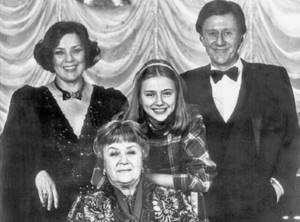
How did Andrei Mironov’s film career develop?
The actor's film debut took place in 1961. In the youth melodrama by Yuli Raizman “What if this is love? “He played a small role of tenth-grader Petya, and the leading roles were played by Zhanna Prokhorenko (already famous in “The Ballad of a Soldier” ) and Igor Pushkarev . Completely innocent, by modern standards, the love story of two schoolchildren, in the 60s seemed unusually bold and caused heated discussions in society (the film “Little Vera” in the late 80s).
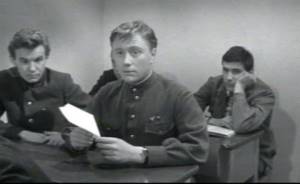
Andrey Mironov. “What if this is love?” 1961
Alexander Zarkhi’s next youth film, “My Little Brother” (1962), was also successful Lyudmila Marchenko , Alexander Zbruev and Oleg Dal played yesterday’s school graduates who left their parents’ home to start an independent life.
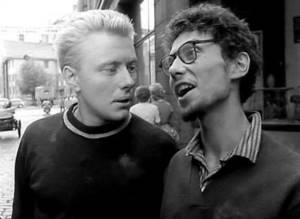
Andrey Mironov and Oleg Dal. “My Little Brother” 1962
A year later, Andrei played his first leading role as veterinarian Roma Lyubeshkin in Genrikh Oganesyan’s comedy “Three Plus Two . It was with her that the stellar career of Mironov and other leading actors began: Natalya Fateeva , Evgeny Zharikov and Natalya Kustinskaya . The film was a resounding success at the Soviet box office. Impressed by the romance of a “wild” holiday, citizens rushed en masse to the Black Sea with tents.
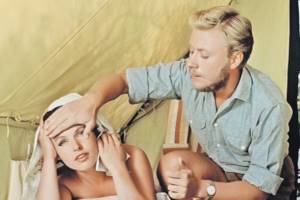
Natalya Fateeva and Andrey Mironov. “Three plus two” 1963
"The Diamond Arm"
Then there was the bright role of speculator Dima Semitsvetov in Eldar Ryazanov’s brilliant comedy “Beware of the Car” (1966), but national fame came to the 28-year-old actor after the release of Leonid Gaidai’s “The Diamond Arm” (1968).
The director saw Georgy Vitsin , but decided to take a risk and approved Mironov. He had no doubt about Semyon Gorbunkov - the script was written specifically for Yuri Nikulin , and three artists applied for the role of Lyolik: Anatoly Papanov , Mikhail Pugovkin and Leonid Satanovsky . We all know who Gaidai chose.
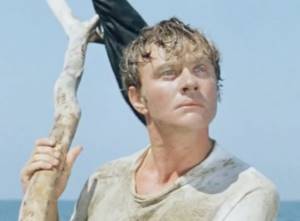
“The Diamond Arm” 1968
Andrey fully justified the director’s trust, brilliantly playing the unsuccessful adventurer Gesha. His masterly lightness and plasticity amazed the audience. No one knew how many exhausting rehearsals were behind this refinement of movements. By the way, according to relatives, nature deprived Mironov of an ear for music. It took him a long time to learn to sing. But can you really believe it when listening to “Island of Bad Luck” performed by him?
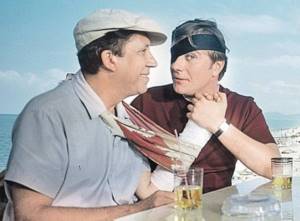
Yuri Nikulin and Andrey Mironov. “The Diamond Arm” 1968
“The Diamond Arm” became the box office leader of 1969 in the Soviet Union and is still a favorite people's film. Many viewers had no doubt that the star duo Mironov-Papanov would appear in Gaidai’s next film, but in “12 Chairs” the main roles were played by other actors. The director did not want to repeat himself, since Andrei, in fact, had already played his own Bender. Moreover, against the background of Sergei Filippov in the role of Kisa Vorobyaninov, he did not look very convincing. After 5 years, Mironov and Papanov will still play the main characters in “12 Chairs” by Mark Zakharov.
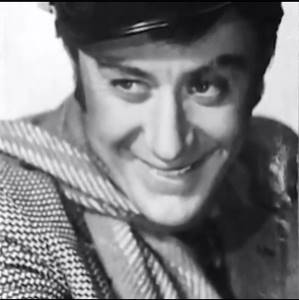
Photo test of Andrei Mironov for the role of Ostap Bendra in “12 Chairs” (1971) Photo livejournal.com
“The Diamond Arm” was followed by many wonderful films: “Property of the Republic” (fencing teacher Shilovsky), “The Incredible Adventures of Italians in Russia” (police captain Vasiliev), “Straw Hat” (rentier Fadinard), “Heavenly Swallows” (singing teacher Celestin ), “Be my husband” (children’s doctor Victor), “The Blonde Around the Corner” (astronomer Nikolai), etc. We know them by heart, but we watch them again and again.
Read also “Be my husband”: how a holiday romance on screen continued in real life
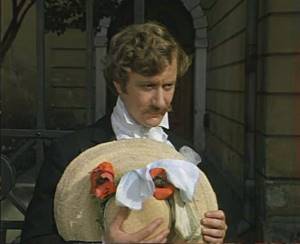
“Straw Hat” 1974
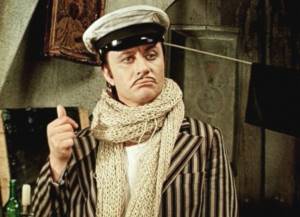
“12 chairs” 1976
Dramatic roles of Andrei Mironov
Mironov dreamed of getting rid of the role of a comedian, but he did not have the opportunity to realize his dramatic gift. Among the huge number of comedies in his filmography, there are only two dramas: “Faryatyev’s Fantasies” by Ilya Averbakh and “My Friend Ivan Lapshin” by Alexei German . In the first of them, Andrei played the idealistic dreamer Faryatiev, who fell in love with a girl who loves another (the role of Alexandra was played by Marina Neelova ), and in the second, he played the psychologically broken writer Khanin, who committed suicide.
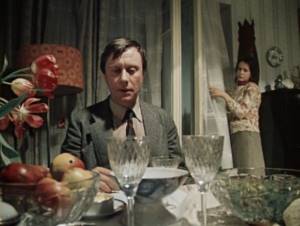
Andrey Mironov and Marina Neelova. Faryatiev’s Fantasies” 1979
Perhaps Mironov would have been able to realize all his creative plans, but fate gave him too little time. The actor played his last role as Mr. Fest in Alla Surikova’s musical film “The Man from Boulevard des Capuchins” (1987)
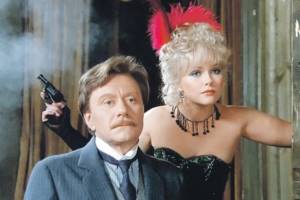
Andrey Mironov and Alexandra Yakovleva. “The Man from the Boulevard des Capucines” 1987
Personal life
Andrei was the favorite of many women. Mironov’s first serious relationship was with his partner in the film “Three Plus Two,” Natalya Fateeva; the lovers already wanted to get married. But the wedding was upset due to the death of Andrei’s father, and subsequently the relationship somehow came to an end on its own.
In 1971, out of great and sincere love, Andrei married actress Ekaterina Gradova, known to everyone for her role as radio operator Kat in the film “Seventeen Moments of Spring.” The couple had a daughter, Mashenka. But after three years, Andrei and Katya divorced
The actor’s second wife was Larisa Golubkina. She was also an actress and had just divorced her husband and was left alone with her little daughter Maria. For ten years, Andrei courted her and made marriage proposals. As a result, they became husband and wife, Mironov adopted Larisa’s daughter, but the girl remained with her mother’s last name – Golubkina.
Both daughters - Maria Mironova and Maria Golubkina - continued the acting dynasty and became quite successful actresses in Russian cinema. Masha Mironova gave birth to a son, Andrei (named after the great father), he is also involved in acting.
Personal life of Andrei Mironov
There were plenty of love affairs in the life of the famous actor, but he did not advertise them. As his stage colleague Vera Vasilyeva : “He was constantly in love with someone.” Natalya Fateeva, is best known . They met on the set of Genrikh Oganesyan’s film “Three Plus Two” (1963), which glorified both Andrei and Natalya.
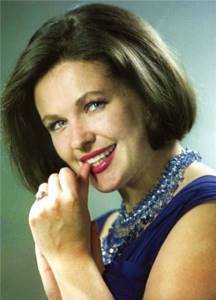
Natalya Fateeva. Photo kino-teatr.ru
Fateeva was 7 years older than Mironov. At that time, she had not yet divorced director Vladimir Basov , but this soon happened. The whirlwind romance did not lead to a wedding, despite strong feelings on Andrei’s part. His mother Maria Vladimirovna, who took an active part in her son’s life, rejected Fateeva’s candidacy. The reason for this was the age of the beauty and the fact that she had a 5-year-old child from her marriage with Basov (in addition, when the introduction ceremony took place, little Volodya, fascinated by the Mironovs’ luxurious apartment, loudly asked Fateeva: “Are we going to live here now?”) . Convinced that her mother was adamant and Mironov was not taking decisive action, Natalya broke off relations with him.
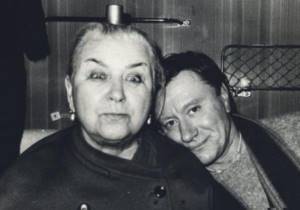
Andrei Mironov with his mother. Photo 2aktera.ru
Andrei’s next romance with actress Tatyana Egorova became known thanks to Egorova herself. In 1999, she published a scandalous autobiographical book “Andrei Mironov and I” , where she presented herself as the main woman in his life and mixed with the well-known substance of her colleagues at the Satire Theater (I read this “love drama” and fully understand those who stopped saying hello with Egorova). By the way, when Leonid Menaker (a relative on his father’s side) asked Mironov why he didn’t marry Tatyana, the actor replied: “Listen, I can’t be compromised 24 hours a day!”
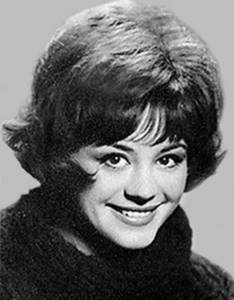
Tatiana Egorova. Photo hab.kp.ru
Andrei Mironov: two wives, famous actresses
For the first time, Andrei married in 1971 to a young actress Ekaterina Gradova , who moved to the Satire Theater from Mayakovka. The actor introduced his chosen one to her mother after they submitted an application to the registry office. The famous couple had a daughter Maria (a future famous actress). This union broke up after 5 years.
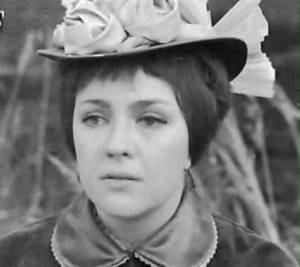
Ekaterina Gradova. “The Hound of the Baskervilles” 1971
Andrei wanted his wife to leave the theater and devote her life to her family, but Gradova was not going to give up her career. After the role of radio operator Kat in “Seventeen Moments of Spring” , she became very popular. But Catherine was not satisfied with her husband’s affairs with their common stage colleagues. According to the actress: “I couldn’t share him with anyone, and I hadn’t yet learned to forgive.”
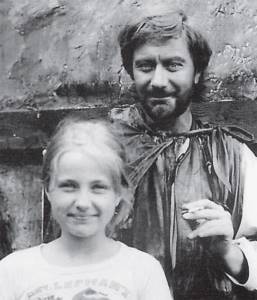
Andrei Mironov with his daughter Maria. Photo back-in-ussr.com
They broke up. Subsequently, Gradova very much regretted that she did not try to save the family, especially since after “Seventeen Moments” she played only one prominent role in the movie - the girlfriend of the thief Ruchechnik ( Evgeniy Evstigneeva ) in the film . ”
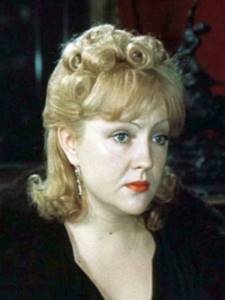
Ekaterina Gradova. “The meeting place cannot be changed” 1979
Mironov entered into his second and last marriage with actress Larisa Golubkina , star of the film “The Hussar Ballad” . They met back in the early 60s, at the birthday party of Larisa’s friend Natalya Fateeva. Then Mironov and Golubkina had a short affair that had no continuation.
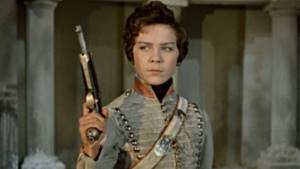
Larisa Golubkina. “Hussar Ballad” 1962
Having divorced Gradova, Andrei resumed his relationship with Golubkina. They lived together for 3 years, and then officially formalized their marriage. The actor adopted his wife's child, 4-year-old Maria .
Larisa meekly agreed to the role of “second fiddle,” as a result of which this union lasted 10 years, until the end of Mironov’s life. In her words: “Literally everything revolved and revolved around Andrei and for him.” Golubkina kept the house impeccably, received her husband’s many guests (even if they showed up after midnight) and turned a blind eye to his adventures. What else could a man dream of?!
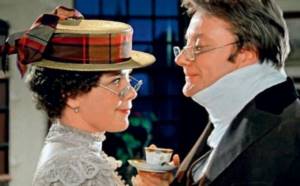
Larisa Golubkina and Andrei Mironov. “Three in a Boat, Not Counting the Dog” 1979
Death
In 1978, during a tour in Tashkent, Andrei suffered a hemorrhage. Doctors diagnosed him with miningitis. But less than two months after the incident, the great artist played on stage, and grateful spectators strewn him with bouquets of fresh flowers, despite the cold winter time.
But no one knew how difficult it was for the actor to play in the theater and act in films; the disease progressed, his body was completely affected by boils. Any movement was accompanied by unimaginable pain. Andrey underwent a complex operation and had his lymph nodes removed.
But on August 14, 1987, on tour in Riga, his last appearance on stage took place. He delivered the hero's monologue in the production of The Marriage of Figaro. The actor felt bad, he began to fall... He was taken to the hospital right from the stage. For two days the doctors did not leave his side and fought for his life. On August 16, a massive cerebral hemorrhage led to the death of the greatest Andrei Mironov. A few days later he was buried in Moscow.
Andrey Alexandrovich Mironov
When it comes to Andrei Mironov, his colleagues unanimously admit that he was the best of them - this is very rare in the artistic environment. An ideal actor, witty without vulgarity and dramatic without unnecessary pathos, he will forever remain one of the main legends of Soviet cinema.
On March 7, Andrei Mironov would have turned 76 years old...
Once in Zvenigorod, Andrei Mironov stood on the street with Eldar Ryazanov and recalled the filming of the film “The Diamond Arm” in Sochi.
In particular, he recalled how, during the filming of an episode in which Yuri Nikulin, himself and Anatoly Papanov participated, from the crowd of onlookers some nimble, unshaven guy broke through to the site itself and, pushing Mironov and Papanov away, ran up to Nikulin shouting : “Great, slob!”
“This is where we,” said Andrei Mironov, “really envied Yuri Nikulin’s popularity among the people.” He didn’t notice Papanov and me...
At this time, some Zvenigorod citizen was passing by on a bicycle. He braked sharply and, staring at Mironov, shouted to the whole street:
- That's how horseradish came to us!
“That’s it, Andrei,” Ryazanov noted. - Now I see that you and Nikulin are quite equal in popularity among the people!
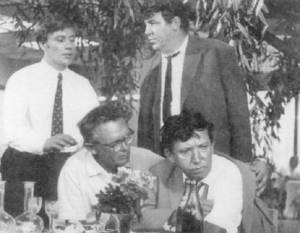
Later, Mironov spoke about this role in the following way: “It is very bitter and difficult for me to come to terms with the idea that for the audience, I know this, my highest achievement in cinema is the film “The Diamond Arm.” It really hurts me a lot."
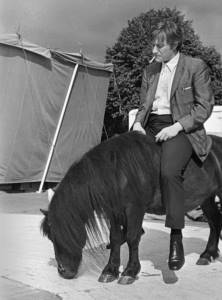
When Georgy Natanson began filming the film “The Re-Wedding,” a tragedy of morals from the life of the party bureaucracy of the 1970s, he was faced with a serious problem with a banal plot: a pure and intelligent girl falls in love with a careerist Ilya, a cynic intellectual who has nothing sacred, but on any occasion, even about death, one immediately finds poignancy. How to motivate such love? And Nathanson invited Mironov to play the role of the careerist - no motivation was required.
stills from the film “Re-Wedding” 1975
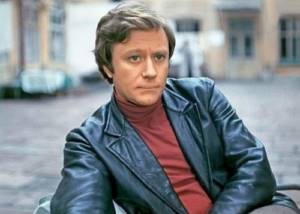
Eldar Ryazanov recalls: “Starting filming of the comedy “The Irony of Fate, or Enjoy Your Bath!”, in which Mironov was invited to play the role of Ippolit, but after reading the script, he refused this role and asked to let him play the role of Lukashin.
However, when the auditions began, Ryazanov realized that this role was not for Mironov. The actor shyly said: “I have never been successful with women... since school... We had a girl, Ira. I fell in love with her in the eighth grade... Then she married Pavel.”
It was impossible to believe that a girl could neglect such a guy as Mironov. As a result, the role went to Myagkov.
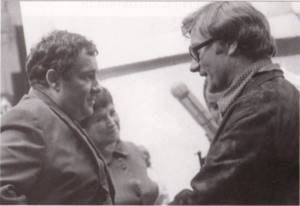
His masculine charm was almost magical. But when he looked in the mirror, he doubted: could anyone really like this? He was plump, with unhealthy skin... However, the women did not notice all this.
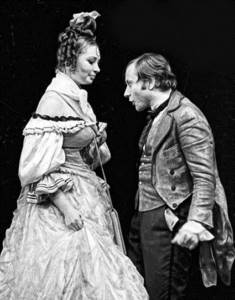
With Tatyana Vasilyeva in the performance of the Satire Theater “The Inspector General”
Actress Tatyana Vasilyeva once admitted: she was almost on the verge of suicide from love for Andrey. “He idolized women,” recalls brother Kirill Laskari. - Sometimes he looked after them too elegantly. I fell in love like crazy. And how he suffered because of Galya, the daughter of the writer Dykhovichny, how he suffered for Anastasia Vertinskaya!.. He really had a lot of novels, but even more were attributed to Andrei Alexandrovich.
In 1962, during the filming of the film “Three Plus Two,” the young actor became interested in the beautiful Natalya Fateeva.
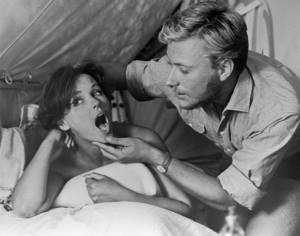
The romance began to develop rapidly and could well have ended in a wedding, but Maria Vladimirovna did not approve of her son’s relationship, and Andrei broke up with Natalya. By the way, before this breakup, at Fateeva’s birthday party, Andrei met Larisa Golubkina. Time passed, and he proposed to the actress, but she then refused...
“It’s no secret that Andryusha was spoiled by the attention of women,” Larisa Golubkina will say many years later. “I partly understand why I didn’t marry him in my younger years.” I couldn't stand it for another day. As a man, he must have gone through a phase with women somewhere between the ages of 19 and 30. Andryusha often told me about his past novels, I was angry, and he ran after me around the apartment and shouted: “No, listen, she...” Then I gave him a piece of paper and said that he had a wonderful opportunity to write memoirs...
In the late 60s, while working in Sochi on Leonid Gaidai’s film “The Diamond Arm,” Mironov became interested in Svetlana Svetlichnaya, although, according to Svetlana Afanasyevna, things didn’t go beyond passionate kisses on the night shore of the Black Sea. Mironov had many office romances, one of them was with Elena Proklova, which broke out on the set of the film “Be My Husband”...
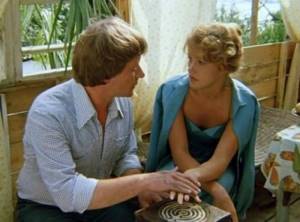
Nevertheless, the actor had only two official marriages, but there was also, however, one special romance that lasted many years - with actress Tatyana Egorova.
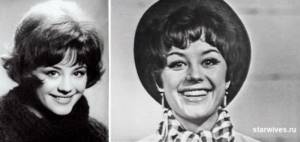
Tatyana Egorova is a bright actress who worked together with Mironov at the Satire Theater. In the play “The Catcher in the Rye” they got the roles of lovers, and their feelings were soon transferred from the stage to real life. But this relationship was not cloudless: Tatyana Egorova’s difficult character was aggravated by jealousy and a difficult relationship with her chosen one’s mother.
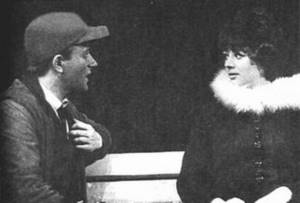
Tatyana Egorova and Andrei Mironov - Sally and Holden in the play "The Catcher in the Rye" 1966.
After the death of Andrei Aleksandrovich, Egorova will write a scandalous book “Mironov and I”, in which she will tell not only about her secret relationship, but also pronounce a verdict on each of the actors of the Satire Theater. “I, of course, wanted to marry Andrei,” Egorova admits today. “We lived together for five years, and it was a crazy life. So much happiness, revelations, love! We were told that we were similar in appearance. It is believed that similar people are made for each other and always get along well. But Maria Vladimirovna did not accept me. I was unknown and poor... Was I jealous of Mironov? But of course! Like any man, he had periods when he was alone. And for him it was unbearable. It seemed to him that the whole country was looking at him, and everyone knew that someone had abandoned him. Mironov needed someone to be nearby all the time. He surrounded himself with female representatives (I called them ikebana in the book) to hide his loneliness and insecurity. And I advised him to marry Golubkina: “You’ve been living with her for three years. Not good, get married. It's a matter of honor." It was important to him what I said. Moreover, his mother liked Larisa. Then, of course, problems began. At one time he suffered greatly from the fact that he was forced to adopt Masha Golubkina, but he did not want this. Andrei said: “Tanya, how can there be two Masha Mironovs?! This is Gogol, Gogol! He was already on the verge of breaking up with Larisa and had recently been living with his mother. Would I have accepted Andrey if he had separated from Golubkina? Yes. When we were over 40 years old, our relationship became completely different... As soon as we decided to unite our lives, God took him to himself. Andrei died in my arms. I howled throughout the hotel, they couldn’t stop me...
In May 1971, he met actress Ekaterina Gradova and on June 29 he formally proposed to her. On November 30, the wedding of Mironov and Gradova took place.
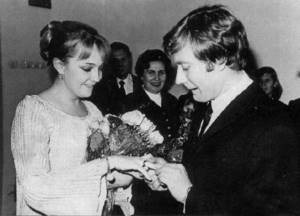
Ekaterina Gradova resignedly took on household chores. In the professional sphere, the husband’s opinion was primarily taken into account - if he was not satisfied with the role offered to Catherine, she refused it. With all this, Gradova considered Mironov a very kind and sympathetic person.

With his own daughter Masha Mironova
In 1973, an important event occurred in the life of the young family - their daughter Maria was born. But Andrei Mironov could not remain faithful to his wife; Ekaterina witnessed her husband’s increased attention to one of the actresses and decided to divorce. Andrei Mironov returned to his parents.
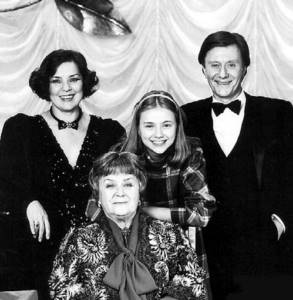
Andrei Mironov, having returned to his parents’ home after a divorce, was unable to lead his usual lifestyle with guests and constant fun. Maria Vladimirovna Mironova added fuel to the fire, reproaching Andrei for leaving his wife with the living space. Therefore, he soon moved in with his old friend Larisa Golubkina. Over the past ten years, Andrei asked Larisa to marry him four times and she always refused. But in 1974, after Mironov’s separation from Ekaterina Gradova, Larisa Golubkina changed her attitude towards Mironov. By this time, her daughter Maria, the namesake of Andrei’s daughter, was also growing up.
Maria Golubkina: “My real father is Andrei Aleksandrovich Mironov. And if dad were alive, he would tear off everyone’s legs for such talk. And when they suddenly began to tell me that Mironov was my stepfather, that I had nothing to do with him, that I was taking advantage of him, I was only surprised at these stupid speeches.”
with little Masha Golubkina
The lack of serious film roles weighed on Mironov. He dreamed of starring in Andrei Tarkovsky, but the director did not see “his” actor in him. Nikita Mikhalkov and other “serious” directors did not invite him either.
The actor himself, in an interview in the mid-70s, assessed his position in cinema as follows: “From the point of view of discovering new possibilities in myself, cinema gave me little... In the theater I am used in a variety of ways. In cinema it’s still very one-dimensional.”
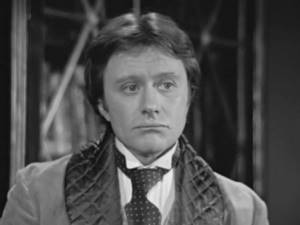
Instead, offers to appear in musical films followed one after another. In 1974, Mironov starred in the film “Lev Gurych Sinichkin”, in 1975 – in the film “Straw Hat”, in 1976 – in the film “Sky Swallows”, in 1977 – in the film “The Twelve Chairs”, in 1978 – “An Ordinary Miracle”, and in 1979 - “Three in a Boat, Not Counting the Dog.”
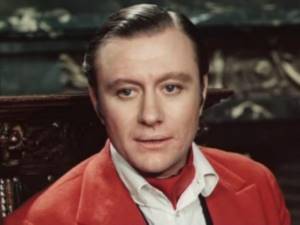
"Sky Swallows" 1976
But still, the theater remained the main application of Mironov’s talent.
In 1969 there was a premiere of this performance. Andrei Mironov played the main role - Figaro. This performance was a great success and for many years became the hallmark of the Satire Theater.
Performance "The Marriage of Figaro"
In the fall of 1978, during a tour in Tashkent, Andrei Mironov suffered a cerebral hemorrhage. He was admitted to the hospital, where doctors diagnosed meningitis. And in the early 1980s, Mironov developed boils on his body. The illness was so severe that it was difficult for the actor to move.
Mikhail Derzhavin said: “In “The Inspector General,” when he fell, Shura Shirvindt and I tried to contrive and catch him so as not to touch the sore spots under the knees and under the armpits. He suffered terribly. Expensive perfume drowned out the pharmaceutical smell of various ointments with which he saved himself. He was given a blood transfusion and autohemotherapy. But nothing helped...” Mironov decided on the most severe operation - lymphadenectomy. Under general anesthesia, his lymph nodes were removed in places where there was a chronic infection. The operation was difficult, but he endured it courageously.
The 1980s were the most difficult years in the life of Andrei Mironov. Despite a chronic cerebral aneurysm, which doctors diagnosed only posthumously, he continued to work actively in cinema and theater, and toured extensively around the country, attracting sold-out crowds.
Finally, director Averbakh invites him into his film, in “Fantasy of Faryatiev”, in this stooped provincial intellectual with slick, sticky hair (Averbakh even forbade Mironov to wash his hair), there was no longer a hint of the sparkling champagne familiar to viewers.
He was a deeply lonely, unhappy man, hiding from the reality around him in a wonderful world of extraterrestrial origin, where everyone is happy and loves each other. With an unsure, awkward gait, he enters the lives of three women. And it even seems as if he is destroying the invisible walls that separate them, by the will of circumstances, living in a cramped apartment, too close to hear each other, and tired of spiritual deafness. But the alien dreamer himself suffers from even greater deafness; he never learned the simplest human feelings, and never understood basic earthly things. In the last frames we look at Faryatiev through the cloudy glass covered with raindrops and it’s as if we see a sleeping baby. Faryatiev slowly opens his eyes and burns us with aching universal emptiness...
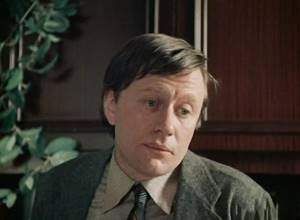
"Faryatyev's Fantasies" 1979
And few people knew that at the same time the actor starred in Alexei German’s film “My Friend Ivan Lapshin” - the film went on the shelf and was released only in 1985.
A. Vislova wrote: “Mironov surprised many, although the innovative aesthetics of the film itself somewhat pushed into the background the impression of the actor’s role... Mironov entered this film very organically. So much so that the audience of the first viewings least of all thought that there was a popular actor on the screen among others. This was his victory, won in a duel with himself, with his own image in the cinema and with the audience, committed to frozen stereotypes of perception. The role of the writer Khanin, which was not immediately noted, in fact turned out to be perhaps his best film role.”

“My friend Ivan Lapshin” 1984
It is customary to talk about Andrei Mironov as an actor who did not realize himself to the fullest, did not play Cyrano de Bergerac, Oblomov, which he so dreamed of. But in his biography there was a completely unique role, in which everything came together - sparkling lightness, enchanting self-irony, masterly verbal duels, and deep drama. This is Figaro - a rogue and a merry fellow, a poet and philosopher, a politician and diplomat. A servant who holds in his hands all the threads of his master's intrigues. An equilibrist who slides along a thin wire over an abyss, juggling witticisms and traps.
Mironov and Pluchek gave the immortal comedy of Beaumarchais a new birth. Figaro's monologue - about honor, dignity and the vicissitudes of fate - was divided into quotes.
“I was forced to follow a road that I entered on without knowing it, and from which I would leave without wanting it...”
This phrase seems prophetic to many today - Mironov managed to utter it at his last performance, on August 14 in Riga. But he was not destined to finish the performance - he lost consciousness right on stage. In the costume of Figaro, he went into immortality, into the legend of the actor who did not know the curtain and played his destiny from the first to the last step.
Actor Quotes
We must especially appreciate moments of happiness and joy - they make people kind.
Treating acting as a pleasant pastime can only be a misunderstanding.
I know everything and one more thing.
My parents - Maria Mironova and Alexander Menaker - almost always rehearsed at home, and very soon I realized what a cruel, painful work it was.
The audience feels sorry for me. Once, during a concert in the Leningrad House of Officers, from the audience they sent me a large orange on stage, on which was written: “Andryusha, eat it. You look bad."
We must try to do everything well: it will turn out bad on its own.
Today's viewers are more educated, more informed, and an actor has no right to be dumber than his viewers.
The actor does not benefit from a smooth, calm biography.
There are two things about an actor: skill and personality. And for a personality to develop and mature, it is not necessary, of course, to go to Siberia or become a loader, but a person must go through something. Take Ulyanov, Smoktunovsky. These are not prosperous people.
I won’t say that I am incredibly happy every minute of my life and that I always want to jump around and have fun, like my hero from “The Diamond Arm,” but nevertheless, I am an optimist.
What I lack in everyday suffering I make up for with moral suffering.
If an actor plays without understudies, it means that he is driven by some selfish desire to play his role “from” to “to”. This always pleases the actor’s ego and gives him an extra boost. Many Italians were involved in the film “The Adventures of Italians...”, and in their eyes I did not want to lower the prestige of Soviet cinema.
You can play in any genre. The only thing I want is for my hero to be no stupider than me.
For me, every performance is a huge stress. I tell myself: “calm down, calm down,” but I can’t: I want to convey everything completely to the viewer, to convince him to the end.
Unfortunately, there are spectators, especially young spectators, who do not want to limit their contact with the actor to the sphere of art: they are on duty on the stairs, tearing off buttons. But this, so to speak, is the cost of the actor’s popularity and audience interest.
Popularity only at first seems like fate, but then it is often an irony of fate.
In films, I am offered mostly one-dimensional roles. This is a young, cheerful comedian or an extravagant swindler.
Like many mere mortals, I love to sing. It just gives me pleasure.
I try to hide the absence of a voice behind irony, parody, and caricature. For me, singing, like dancing, is not an end in itself, but one of the ways to express the character of the hero. So please don't take my singing seriously: it's not me who sings, it's the people I play who sing. And all complaints are directed at them.
I'm generally not a very confident person.
I love the fast pace of life, which makes me feel needed.
Which actor has not thought about Hamlet! Me too. But the dream remains a dream, and over the years, reality encourages him to play Claudius, rather than Hamlet. It all ends with Polonius, and then simply ends with the gravedigger... It’s better not to tear yourself away from the sinful earth.
They wrote about me in different ways. It’s nice, of course, when people praise you. But in principle, I am guided by Mayakovsky’s rule. He was never interested in whether he was praised or scolded. He asked: “Respect?”
In our country, to live, you have to die.
A wonderful thing is travel. It never ends with returning home. Everything you see falls into the emotional areas of memory, and then from this source you draw material for new roles.
To fall off a horse, you have to get on it.
In our profession, past merits are not considered.
I used to think that I was an easy person too. But I notice: over the years I get heavier, I become gloomier.
I don’t particularly understand the meaning of the word “hobby” in Russian. In general, I love cheesecakes and ballet.
Life is a great blessing. And, as it turns out, a person’s life is very short.
If I stop, I'll die.
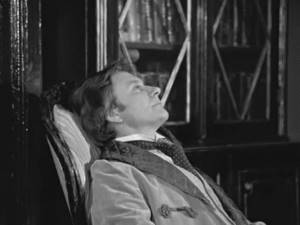
Happy birthday, Andrey Alexandrovich!

